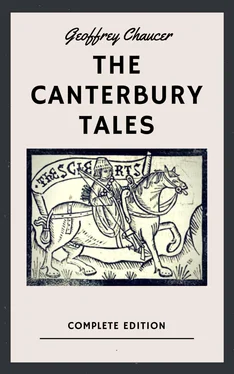Geoffrey Chaucer - Geoffrey Chaucer - The Canterbury Tales (English Edition)
Здесь есть возможность читать онлайн «Geoffrey Chaucer - Geoffrey Chaucer - The Canterbury Tales (English Edition)» — ознакомительный отрывок электронной книги совершенно бесплатно, а после прочтения отрывка купить полную версию. В некоторых случаях можно слушать аудио, скачать через торрент в формате fb2 и присутствует краткое содержание. Жанр: unrecognised, на английском языке. Описание произведения, (предисловие) а так же отзывы посетителей доступны на портале библиотеки ЛибКат.
- Название:Geoffrey Chaucer: The Canterbury Tales (English Edition)
- Автор:
- Жанр:
- Год:неизвестен
- ISBN:нет данных
- Рейтинг книги:3 / 5. Голосов: 1
-
Избранное:Добавить в избранное
- Отзывы:
-
Ваша оценка:
- 60
- 1
- 2
- 3
- 4
- 5
Geoffrey Chaucer: The Canterbury Tales (English Edition): краткое содержание, описание и аннотация
Предлагаем к чтению аннотацию, описание, краткое содержание или предисловие (зависит от того, что написал сам автор книги «Geoffrey Chaucer: The Canterbury Tales (English Edition)»). Если вы не нашли необходимую информацию о книге — напишите в комментариях, мы постараемся отыскать её.
Th' arc of his artificial day had run
The fourthe part, and half an houre more;
And, though he were not deep expert in lore,
He wist it was the eight-and-twenty day
Of April, that is messenger to May;
And saw well that the shadow of every tree
Was in its length of the same quantity
That was the body erect that caused it;
And therefore by the shadow he took his wit."
Geoffrey Chaucer: The Canterbury Tales (English Edition) — читать онлайн ознакомительный отрывок
Ниже представлен текст книги, разбитый по страницам. Система сохранения места последней прочитанной страницы, позволяет с удобством читать онлайн бесплатно книгу «Geoffrey Chaucer: The Canterbury Tales (English Edition)», без необходимости каждый раз заново искать на чём Вы остановились. Поставьте закладку, и сможете в любой момент перейти на страницу, на которой закончили чтение.
Интервал:
Закладка:
Chaucer is next found occupying a post which has not often been held by men gifted with his peculiar genius — that of a county member. The contest between the Dukes of Gloucester and Lancaster, and their adherents, for the control of the Government, was coming to a crisis; and when the recluse and studious Chaucer was induced to offer himself to the electors of Kent as one of the knights of their shire — where presumably he held property — we may suppose that it was with the view of supporting his patron's cause in the impending conflict. The Parliament in which the poet sat assembled at Westminster on the 1st of October, and was dissolved on the 1st of November, 1386. Lancaster was fighting and intriguing abroad, absorbed in the affairs of his Castilian succession; Gloucester and his friends at home had everything their own way; the Earl of Suffolk was dismissed from the woolsack, and impeached by the Commons; and although Richard at first stood out courageously for the friends of his uncle Lancaster, he was constrained, by the refusal of supplies, to consent to the proceedings of Gloucester. A commission was wrung from him, under protest, appointing Gloucester, Arundel, and twelve other Peers and prelates, a permanent council to inquire into the condition of all the public departments, the courts of law, and the royal household, with absolute powers of redress and dismissal. We need not ascribe to Chaucer's Parliamentary exertions in his patron's behalf, nor to any malpractices in his official conduct, the fact that he was among the earliest victims of the commission.<9> In December 1386, he was dismissed from both his offices in the port of London; but he retained his pensions, and drew them regularly twice a year at the Exchequer until 1388. In 1387, Chaucer's political reverses were aggravated by a severe domestic calamity: his wife died, and with her died the pension which had been settled on her by Queen Philippa in 1366, and confirmed to her at Richard's accession in 1377. The change made in Chaucer's pecuniary position, by the loss of his offices and his wife's pension, must have been very great. It would appear that during his prosperous times he had lived in a style quite equal to his income, and had no ample resources against a season of reverse; for, on the 1st of May 1388, less than a year and a half after being dismissed from the Customs, he was constrained to assign his pensions, by surrender in Chancery, to one John Scalby. In May 1389, Richard II., now of age, abruptly resumed the reins of government, which, for more than two years, had been ably but cruelly managed by Gloucester. The friends of Lancaster were once more supreme in the royal councils, and Chaucer speedily profited by the change. On the 12th of July he was appointed Clerk of the King's Works at the Palace of Westminster, the Tower, the royal manors of Kennington, Eltham, Clarendon, Sheen, Byfleet, Childern Langley, and Feckenham, the castle of Berkhamstead, the royal lodge of Hathenburgh in the New Forest, the lodges in the parks of Clarendon, Childern Langley, and Feckenham, and the mews for the King's falcons at Charing Cross; he received a salary of two shillings per day, and was allowed to perform the duties by deputy. For some reason unknown, Chaucer held this lucrative office <10> little more than two years, quitting it before the 16th of September 1391, at which date it had passed into the hands of one John Gedney. The next two years and a half are a blank, so far as authentic records are concerned; Chaucer is supposed to have passed them in retirement, probably devoting them principally to the composition of The Canterbury Tales. In February 1394, the King conferred upon him a grant of L20 a year for life; but he seems to have had no other source of income, and to have become embarrassed by debt, for frequent memoranda of small advances on his pension show that his circumstances were, in comparison, greatly reduced. Things appear to have grown worse and worse with the poet; for in May 1398 he was compelled to obtain from the King letters of protection against arrest, extending over a term of two years. Not for the first time, it is true — for similar documents had been issued at the beginning of Richard's reign; but at that time Chaucer's missions abroad, and his responsible duties in the port of London, may have furnished reasons for securing him against annoyance or frivolous prosecution, which were wholly wanting at the later date. In 1398, fortune began again to smile upon him; he received a royal grant of a tun of wine annually, the value being about L4. Next year, Richard II having been deposed by the son of John of Gaunt <11> — Henry of Bolingbroke, Duke of Lancaster — the new King, four days after hits accession, bestowed on Chaucer a grant of forty marks (L26, 13s. 4d.) per annum, in addition to the pension of L20 conferred by Richard II. in 1394. But the poet, now seventy-one years of age, and probably broken down by the reverses of the past few years, was not destined long to enjoy his renewed prosperity. On Christmas Eve of 1399, he entered on the possession of a house in the garden of the Chapel of the Blessed Mary of Westminster — near to the present site of Henry VII.'s Chapel — having obtained a lease from Robert Hermodesworth, a monk of the adjacent convent, for fifty-three years, at the annual rent of four marks (L2, 13s. 4d.) Until the 1st of March 1400, Chaucer drew his pensions in person; then they were received for him by another hand; and on the 25th of October, in the same year, he died, at the age of seventy-two. The only lights thrown by his poems on his closing days are furnished in the little ballad called "Good Counsel of Chaucer," — which, though said to have been written when "upon his death-bed lying in his great anguish, "breathes the very spirit of courage, resignation, and philosophic calm; and by the "Retractation" at the end of The Canterbury Tales, which, if it was not foisted in by monkish transcribers, may be supposed the effect of Chaucer's regrets and self-reproaches on that solemn review of his life-work which the close approach of death compelled. The poet was buried in Westminster Abbey; <12> and not many years after his death a slab was placed on a pillar near his grave, bearing the lines, taken from an epitaph or eulogy made by Stephanus Surigonus of Milan, at the request of Caxton:
"Galfridus Chaucer, vates, et fama poesis
Maternae, hoc sacra sum tumulatus humo." <13>
About 1555, Mr Nicholas Brigham, a gentleman of Oxford who greatly admired the genius of Chaucer, erected the present tomb, as near to the spot where the poet lay, "before the chapel of St Benet," as was then possible by reason of the "cancelli," <14> which the Duke of Buckingham subsequently obtained leave to remove, that room might be made for the tomb of Dryden. On the structure of Mr Brigham, besides a full-length representation of Chaucer, taken from a portrait drawn by his "scholar" Thomas Occleve, was — or is, though now almost illegible — the following inscription:—
M. S.
QUI FUIT ANGLORUM VATES TER MAXIMUS OLIM,
GALFRIDUS CHAUCER CONDITUR HOC TUMULO;
ANNUM SI QUAERAS DOMINI, SI TEMPORA VITAE,
ECCE NOTAE SUBSUNT, QUE TIBI CUNCTA NOTANT.
25 OCTOBRIS 1400.
AERUMNARUM REQUIES MORS.
N. BRIGHAM HOS FECIT MUSARUM NOMINE SUMPTUS
1556. <15>
Concerning his personal appearance and habits, Chaucer has not been reticent in his poetry. Urry sums up the traits of his aspect and character fairly thus: "He was of a middle stature, the latter part of his life inclinable to be fat and corpulent, as appears by the Host's bantering him in the journey to Canterbury, and comparing shapes with him.<16> His face was fleshy, his features just and regular, his complexion fair, and somewhat pale, his hair of a dusky yellow, short and thin; the hair of his beard in two forked tufts, of a wheat colour; his forehead broad and smooth; his eyes inclining usually to the ground, which is intimated by the Host's words; his whole face full of liveliness, a calm, easy sweetness, and a studious Venerable aspect. . . . As to his temper, he had a mixture of the gay, the modest, and the grave. The sprightliness of his humour was more distinguished by his writings than by his appearance; which gave occasion to Margaret Countess of Pembroke often to rally him upon his silent modesty in company, telling him, that his absence was more agreeable to her than his conversation, since the first was productive of agreeable pieces of wit in his writings, <17> but the latter was filled with a modest deference, and a too distant respect. We see nothing merry or jocose in his behaviour with his pilgrims, but a silent attention to their mirth, rather than any mixture of his own. . . When disengaged from public affairs, his time was entirely spent in study and reading; so agreeable to him was this exercise, that he says he preferred it to all other sports and diversions.<18> He lived within himself, neither desirous to hear nor busy to concern himself with the affairs of his neighbours. His course of living was temperate and regular; he went to rest with the sun, and rose before it; and by that means enjoyed the pleasures of the better part of the day, his morning walk and fresh contemplations. This gave him the advantage of describing the morning in so lively a manner as he does everywhere in his works. The springing sun glows warm in his lines, and the fragrant air blows cool in his descriptions; we smell the sweets of the bloomy haws, and hear the music of the feathered choir, whenever we take a forest walk with him. The hour of the day is not easier to be discovered from the reflection of the sun in Titian's paintings, than in Chaucer's morning landscapes. . . . His reading was deep and extensive, his judgement sound and discerning. . . In one word, he was a great scholar, a pleasant wit, a candid critic, a sociable companion, a steadfast friend, a grave philosopher, a temperate economist, and a pious Christian."
Читать дальшеИнтервал:
Закладка:
Похожие книги на «Geoffrey Chaucer: The Canterbury Tales (English Edition)»
Представляем Вашему вниманию похожие книги на «Geoffrey Chaucer: The Canterbury Tales (English Edition)» списком для выбора. Мы отобрали схожую по названию и смыслу литературу в надежде предоставить читателям больше вариантов отыскать новые, интересные, ещё непрочитанные произведения.
Обсуждение, отзывы о книге «Geoffrey Chaucer: The Canterbury Tales (English Edition)» и просто собственные мнения читателей. Оставьте ваши комментарии, напишите, что Вы думаете о произведении, его смысле или главных героях. Укажите что конкретно понравилось, а что нет, и почему Вы так считаете.












